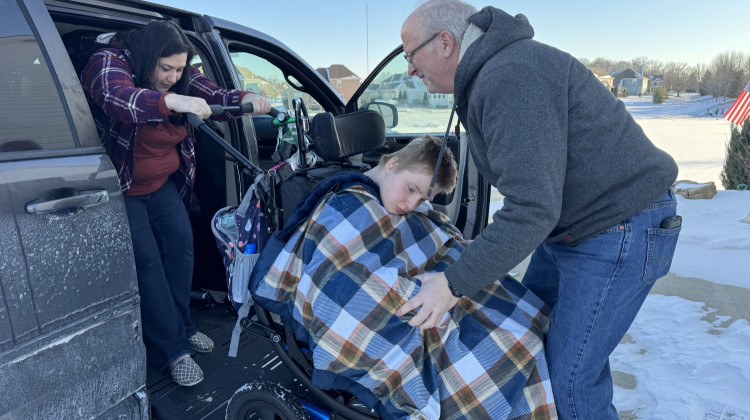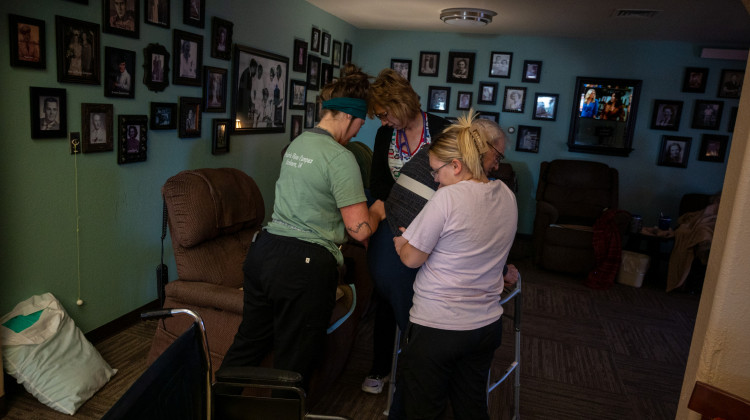
Indiana Rep. Steven Davisson,R-Salem, is chair of the Interim Study Committee on Public Health, Behavioral Health and Human Services.
TheStatehousFile.comINDIANAPOLIS – More than 10,000 Hoosiers received treatment for opioid addiction last year.
Opioid addiction is in “epidemic proportions in this state,” said Dean Babcock, the vice president of Midtown Community Mental Health Center.
The Interim Study Committee on Public Health, Behavioral Health and Human Services met Wednesday to discuss the treatments for opioid addiction, particularly focused on take-home doses of methadone.
Currently, the most common treatment for opioid addiction involves methadone. It is used as an anti-addictive and reductive preparation for patients with opioid dependence.
Midtown Health Center is one of 13 opiate treatment centers in Indiana – all volunteer based admission. That number of centers is capped by the state and each facility must submit an annual recertification application to continue administering treatments.
As an incentive, patients receiving treatment can begin to take home their medication for good behavior. The longer a patient has been in the program, the more dosages they are allowed to take home.
Dr. Leslie Hulvershorn said patients allowed to take their medications home respond more quickly to the treatment and get better faster than those who do not.
Some worry the take-home medication will be abused. But under federal law and House Bill 1218 – authored by committee chairman Rep. Steven Davisson, R-Salem – there are several checks to avoid abuse.
To take home medication, patients must:
- Keep their medication in labeled bottles
- Keep their medication is some sort of locked container
- Provide a clean urine sample (but if a patient fails a urine test, they are not automatically out of the program or lose their take home privileges)
- Participate in call backs – the treatment center can call patients at anytime to bring in bottles for a count
Methadone is not covered by Medicaid and costs about $125-$130 a week for prescription at a non-state funded medical treatment center.
Three of the 13 treatment centers – including Midtown in Indianapolis – receive some state funding for their mental health care practices. It costs patients $75 a week for their prescription at these facilities.
That raised questions as to why treatment centers do not use similar drugs – buprenorphine and suboxone – covered by Medicaid.
“Why are we using methadone? Buprenorphine is better,” said Dr. Richard Feldman, one of the committee members. “Methadone is a nasty drug.”
But, Hulvershorn said buprenorphine is not commonly used because it requires additional training, making it harder for patients to find a provider. And she said that methadone has a higher success rate – 2.5 percent of patients fully discharged stay clean.
The study committee also discussed opportunities to provide better health care options for children who are visually impaired in the state.
Members from the Visually Impaired Preschool Services advocated creating a statewide program that offers services to blind children.
Several parents offered emotional testimonials of their child’s experience and the help they received from Visually Impaired Preschool Services.
Diane Nelson, executive director for Visually Impaired Preschool Services, said each visual specialist works with about 20 families.
The Visually Impaired Preschool Services currently works with more than 400 children in Indiana and Kentucky. And an estimated 300-400 more young Hoosiers need help according to a Visually Impaired Preschool Services specialist.
The committee tentatively planned to meet again on Aug. 28 to continue these discussions and others.
Paige Clark is a reporter for TheStatehouseFile.com, a news website powered by Franklin College journalism students.
 DONATE
DONATE






 View More Programs
View More Programs



 Support WFYI. We can't do it without you.
Support WFYI. We can't do it without you.